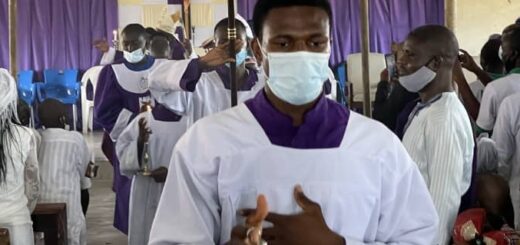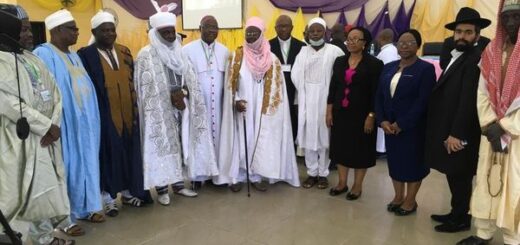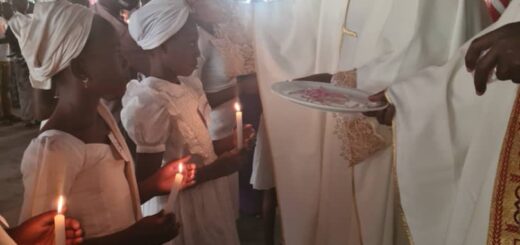Respond to the Call of God
by ARCH BISHOP · January 17, 2021
2nd Sunday, Year B, Homily by Archbishop I. A. Kaigama, at St. Ignatius of Antioch Parish, Karu, 17.01.2021.
Readings: 1 Samuel 3:3-10, 19; Ps. 39 (40): 2, 4, 7-10; 1 Cor. 6:13-15, 17-20; John 1:35-42.
INTRODUCTION
The Church today invites us to respond to God who in a unique manner calls each one of us. The dramatic call of young Samuel while he served under the priest Eli, in the shrine at Shiloh and Samuel’s response to the voice of God reminds us that God still speaks to us in our contemporary world. We should not be deafened by the voices around us that we do not hearken to the voice of God, neither should we be so hyperactive or in a hurry that we hardly have time to listen to God. God urges us in Psalm 46:10, “Be still and know that I am God”.
SAMUEL AND THE YOUTHS OF OUR GENERATION
Samuel was born to a barren couple by divine intervention. Hannah his mother had dedicated him to God in gratitude for the gift of his birth. According to the first reading, Samuel heard the Lord’s call three times and thought it was Eli who was calling. Eli advised him to answer when next he hears another call and say, “Speak, Lord, your servant is listening” (1 Sm. 3:9).
It is worth noting that Eli preferred teenage Samuel to be with him in his priestly office rather than any of his sons, Hophni and Phinehas, “who were worthless men who had no regard for Yahweh” (1 Sm. 2:12). They were reckless and immoral, and a grief to Eli, but Samuel was his joy.
The call of young Samuel today as that of Jeremiah shows that God calls not only the elderly but also the young to work for Him. The youth are therefore challenged to play more active roles in evangelization. In political governance, they are also to be given a chance to participate fully rather being seen as immature citizens and agents of crimes. With their talents and energy they can surely make meaningful contributions to our country. I recall that during the last general elections, there was a “not too young to rule” campaign. In his New Year message President Buhari described the young people as “our most valuable natural resource, at home and abroad. Their ingenuity, creativity, innovation and entrepreneurial spirit are evident to all.”
Our President promised that the Government will actively engage with our young people, to turn their passions into ideas that can be supported, groomed and scaled across regions. I hope that this declaration is truly meant to open the economic and political space to our young people, de-emphasizing monetary extortion, the practice of favouritism, nepotism, godfathers’ manipulations, and outright election rigging that excludes the youth from political participation.
The distraction and destruction caused by massive corruption is what weakens, confuses and destabilizes our young people and thus, their inability to key into the project of “one people, one nation”. For too long, ethnic stereotyping and deep religious prejudices have dominated our national life and discourse that these young people have grown up knowing nothing but the language of division, hatred, greed and manipulation. Are we surprised that after 60 years of independence our national growth is sluggish? Let us prove that we mean what we say in the future elections by giving our youth the political oxygen to make meaningful contributions to our democratic project.
In our Gospel today, Andrew invited his brother Peter to “come and see the Messiah”. These two disciples followed Jesus and were so impressed in the few hours they spent with Him that Andrew went and told His brother Simon: “we have found the Messiah” (Jn. 1:41). The lesson is that we must not delay to tell others about Jesus, the inexhaustible source of truth and life, the same yesterday, today, and forever.
THE BAPTIZED CALLED TO BE PRIESTS AND PROPHETS
In order to renew the face of the earth, God calls people of different professions such as doctors, nurses, lawyers, pilots, engineers, teachers, traders, bankers, soldiers, etc. to dispose themselves to be transformed into full-time Christians rather than part time, and to exercise their priestly and prophetic ministry without counting the cost.
SANCTITY OF THE BODY
As we confer the sacrament of confirmation today, the Lord grants the candidates and indeed, all of us, the gift of the Holy Spirit, to become His witnesses in the world. Like the Blessed Virgin Mary, our response should be a total and wholehearted “Yes”. We must not let sin poison our relationship with God. We must rely on the grace of God which Christ promises is sufficient for us (cf. 2 Cor. 12:9).
The second reading from 1 Cor. 6 cautions us that our body is not meant for immorality; it is for the Lord. St. Paul advises us not to use our bodies for fornication because they are temples of the Holy Spirit, the dwelling of God. He teaches that fornication is a sin against the dignity of our human body as well as a sin against our conscience, a violation of the image of God in our being. That today some women and children are trafficked, some raped and dehumanized is a monumental tragedy. Unfortunately, there is also easy access to very damaging pornographic materials in the internet. The alleged plan to host a “sex party” recently in Kaduna State is an indication of the level of moral decadence in our society.
The Catechism of the Catholic Church #2345 teaches that chastity is a moral virtue that is both a grace from God and a fruit of spiritual effort. Let us pray for this gift.
CONCLUSION: LESSONS FOR PRIESTS AND PASTORS
Samuel should be our model priest and prophet. The blasphemous behaviour of the sons of Eli the priest was the very opposite of priestly fidelity and selflessness. Instead of serving the needs of others and leading the way to Christ, some pastors and priests today aim at winning allegiance to themselves to become the rallying point, a kind of personality cult. Nigeria needs priests and pastors after the heart of Christ rather than those after their own hearts and the pursuit of personal ambition, while masquerading as prophets, servants or men of God.
Priests and pastors in Nigeria, like Samuel, should concentrate more on rebuilding broken lives, broken homes; to help rid our society of social evils, and in our religiously polarized and tribally fragmented nation, to foster peace and harmonious coexistence.
To the Parish Priest of St. Ignatius of Antioch, Karu, Rev. Fr. Samuel Tarvihi, members of the Parish Pastoral Council and all the different Church societies, may God make you conduits of grace and signposts so that through you many will “come and see” Jesus. May your parish continue to grow from grace to grace.




